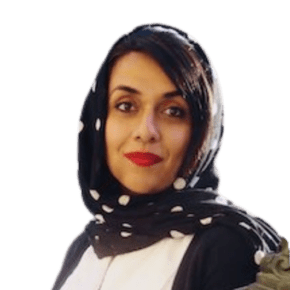Q – Hi Ayisha, and thanks for joining us! Being a ghost writer and working with Nadiya Hussain sounds fascinating. Would you be able to tell us a bit more about that experience?
Ayisha Malik – Glad to be here! Ghost writing was an excellent exercise in self-discipline, but it also helped me realise that when you have a structure in place you can write a novel in two months. I was writing full-time then, so of course that matters, but it was a brilliant tool for helping me focus the narrative.
We had brainstorm sessions in which Nadiya would tell me what she wanted to write about, and then we’d come up with a plot and character profiles all in the space of an afternoon. I would then be sent a storyboard by the editor, but this would be nothing more than a few lines of what happens in the chapter.
Knowing what would happen in a chapter really helped me to focus on where the conflict and tension was. You can’t always write a story like that, of course, but it’s worth considering having a rough outline in place in order to be able to see plot holes and issues.
I could wax lyrical about having a structure in place! It’s the single hardest thing to get right, so it’s really worth thinking about. Having said that, many writers do just go in with a germ of an idea and let it lead them, so different techniques work for different writers.
Q – What’s the editing process like after such as quick write?
AM – After a quick write I’d like to leave the manuscript alone for a few weeks – if it was really quick, maybe six months… Editing can be the most frustrating but also the most exciting part of the book. There’s no real time limit, I’d say (I still edit my published books in my head), but the more refined your ideas are in the first instance and the longer you spend on the first draft, the less you should have to edit.
If there are issues of sensitivity I would seek someone involved in or related to the issue – for example, I wrote a lot about an Irish family, so I asked an Irish friend to read and advise me if anything seemed wrong.
– Ayisha Malik
Q – Do you use beta readers or critique partners? What do you find are the most effective ways of editing the later drafts of your manuscript?
AM – With my first novel I had a friend who’s an editor read it, and she was incredibly helpful. I made changes based on her feedback and then sent it to an agent. However, I had a report done on my second novel (even though I had a contract) by an objective editor who helped a lot.
If there are issues of sensitivity I would seek someone involved in or related to the issue – for example, I wrote a lot about an Irish family, so I asked an Irish friend to read and advise me if anything seemed wrong.
Q – How did you choose your objective editor?
AM – I went through Cornerstones Literary Consultancy as I used to work there, and they chose one for me. It’s good to investigate and do your research before getting professional feedback, but I’d definitely recommend it.
I’d also often be careful of asking friends to read – unless they’re seasoned writers.
Q – What about friends who are seasoned readers?
AM – Too many opinions can cloud your vision, and I’d be more inclined to look for professional feedback, even if it’s just the first 30 pages.
Also, although it’s nice to hear, at this stage you don’t just want to know if someone liked it or not. What you really need is to hear from someone who can pinpoint why they liked it (and why they didn’t).
I think the reason Sofia Khan resonated with readers, despite her being a practising Muslim and hijabi, was that the issues she had were universal: love, loss, dating!
– Ayisha Malik
Q – As a BAME writer, how did you successfully manage to write about a BAME character for a mainstream audience? Do you have any advice for BAME individuals trying to break into the industry?
AM – That’s a good question. I think what you have to do is really think about the character as a human being first (I’m sorry if that sounds twee). From my own experience – when I wrote Sofia Khan – I think the reason she resonated with readers, despite her being a practising Muslim and hijabi, was that the issues she had were universal: love, loss, dating!
The same goes with my latest book – it doesn’t matter about race and gender in the end, we all have the same basic human needs. Of course, identity informs character and narrative, but don’t think too much of their identity, I’d say. Think of their struggles.
When it comes to getting published, have a look at the agent’s list. See how your book fits into that. Lots of agents are looking for BAME writers, so target those.
Q – Have your methods changed from your first novel to where you are now?
AM – Yes, very much so. My ghost writing has taught me the importance of having a structure in place. I’m a lot more careful with that now, but I do still tend to finish the first draft in a flurry and then go back to edit, which can take a while. However, I find if I edit while I go along I lose momentum and the story loses its sparkle
Structure is the hardest to get right. Always ask yourself: how does this move the story/character forward? We can fall so in love with some of our own writing that we find it hard to let go, but sometimes you do have to kill your darlings.
– Ayisha Malik
Q – You must have an amazing process in terms of outlining and structuring, given your ability to ghost write a book in two months! I have just finished reading John Yorke’s Into the Woods, which is all about structure. Have you got any tips about structuring at speed?
AM – Thank you! I learn with each new book I write. As for structuring and outlining, do have a read of Hilary Mantel’s essay ‘Growing a Tale’. It has some great advice on how to start a book, taking your ideas and then just stocking them up on post-its on a noticeboard. Slowly something will come of that.
Then I’d go about doing what Nadiya’s editor did: what the story is, who the characters are, and jotting down (no more than a few lines) what happens in each chapter. If you’re wondering where the tension, conflict or character growth is, then perhaps it’s not needed. It can help weed out extraneous words and get to the heart of the matter.
Q – Putting a structure in place beforehand is something I really struggle with. I seem only to be able to let things unfold organically, but my book lacks structure!
AM – Structure is the hardest to get right. Always ask yourself: how does this move the story/character forward? We can fall so in love with some of our own writing that we find it hard to let go, but you do have to kill your darlings because it affects pace, and that influences structure.
Also, in terms of structure, it’s useful to think of what your midpoint is. That’s usually a key moment in the novel and middles are where books are apt to get baggy, so try and ensure you have a strong midpoint (something significant happens).
Q – How helpful is it to do a MA in creative writing?
AM – An MA for me was more about having the confidence to pursue writing as a career. I did mine at Kingston many years ago and I don’t think the course structure then was at its best. I learnt more working at Cornerstones Literary Consultancy if I’m honest. But doing it did convince me to try and actually write for a living. I’m only scraping by!
What I’ve learnt is that when the pace is slow, it’s important to seed in the emotional arc of characters so, as readers, we’re invested in them and understand their actions.
– Ayisha Malik
Q – Do you usually find that the structure is mostly in place by the end of the first draft, or can I change dramatically in the editing process?
AM – I wish! I try to follow my structure rules, but I often struggle with the beginning of novels. My novels tend to start slow and then pick up pace – the second half always tends to be more enjoyable than the first. But what I’ve learnt is that when the pace is slow, it’s important to seed in the emotional arc of characters so, as readers, we’re invested in them and understand their actions. I’m a lot more diligent with how much I cut now, though. I’ve learnt to let go a little more…
Also, when looking at your story arc in terms of structure, do think about how the character’s emotional arc develops with the storyline. How do they change with the story? What’s the interplay there? How does one impact the other? When writing it’s often about asking the right questions.
Q – Do you find that your work as an editor feeds into your own writing?
AM – Yes, absolutely, You’re able to think a lot more critically about what you’re doing. Having said that, I still need an editor. It’s hard to be objective about your own work!
Q – Do you have any advice that you would give your greener self?
AM – Don’t rush the first book! The one you don’t yet have a contract for. I wish I’d enjoyed writing it a bit more as opposed to worrying so much about finding an agent and getting a deal… I don’t know if that helps, but it’s a wonderful thing writing your first novel. Savour it.
I’d also advise not to rush into a story the minute you have an idea. Now, I usually let ideas percolate for a few weeks. Often the buzz of a new idea will wear after a little while. If it doesn’t, then it’s the story you have to tell.
Don’t be afraid of giving yourself a deadline. I usually plan out how much of my novel I’ll write months ahead of time. So, I’ve told myself I have to write 20K in December. That gives me 1K to write a day Mon–Fri (leaving weekends free because it’s important to keep your sanity!).
– Ayisha Malik
Q – Does that mean subsequent books (after the first one) get harder? Or more stressful?
AM – Not harder, per se, but once you have a contract you have deadlines, so I’d say more stressful, yes. You often have to deliver book two in a year, and in that time you have to edit the first, do publication stuff (PR etc.), think of a new idea and finish a novel…
Q – One of the problems I’m having with my first novel is not having a deadline – there’s only me driving it forward. I almost wish there was a bit more pressure!
AM – Don’t be afraid of giving yourself a deadline. They can help. Maybe try NaNoWriMo. I usually plan out how much of my novel I’ll write months ahead of time. So, I’ve told myself I have to write 20K in December. That gives me 1K to write a day Mon–Fri (leaving weekends free because it’s important to keep your sanity!). I’ve done that until end of April, so I know the first draft HAS to be done – but make sure you give yourself achievable deadlines
Q – I’d love to ask you about your third novel being optioned for TV. How did that come about?
AM – PFD (the agency I’m with) has a TV/Rights department, they sent out the third book and we got lucky! It’s worth checking the agencies you approach to see what their film/TV division is like.
Q – Thank you for your time, Ayisha! It’s been great chatting to you.
AM – You’re very welcome! One of the best pieces of advice I was given was to finish that first draft. No editing or re-reading, just plough ahead. Writing can be a minefield but take it bird by bird (incidentally a great book on writing!). Good luck!

























